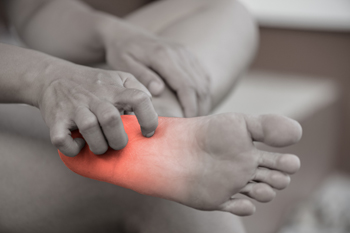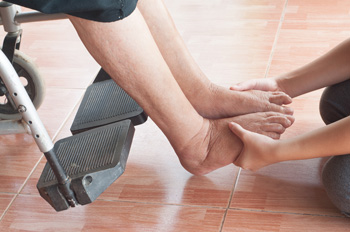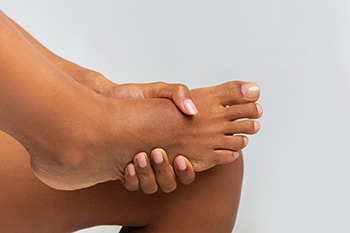Port Neches, TX (409) 727-1122
December 2022
Three Groups of Nerves

Damaged nerves in the feet may cause a condition that is called neuropathy. The network of nerves that are found outside the central nervous system are referred to as the peripheral nervous system, and are separated into three categories. Pain and touch are controlled by the sensory nerves, and natural functions consisting of blood pressure and bladder control are grouped into the autonomic nerves. The motor nerves are responsible for controlling muscle movement, and approximately 10 percent of the population in the United Kingdom is affected by neuropathy. Common symptoms that people can experience include a loss of balance, weakened feet, and there may be a numbing, or burning sensation in the hands and feet. People who are diabetic may be susceptible to developing neuropathy, as a result of elevated blood sugar levels. Additionally, a nerve injury may cause this condition, or it may occur from taking specific medications. If you have any of the above symptoms, it is suggested that you seek the counsel of a podiatrist who can guide you toward the right treatment solutions.
Neuropathy
Neuropathy can be a potentially serious condition, especially if it is left undiagnosed. If you have any concerns that you may be experiencing nerve loss in your feet, consult with Pete O’Donald, DPM from Texas. Our doctor will assess your condition and provide you with quality foot and ankle treatment for neuropathy.
What Is Neuropathy?
Neuropathy is a condition that leads to damage to the nerves in the body. Peripheral neuropathy, or neuropathy that affects your peripheral nervous system, usually occurs in the feet. Neuropathy can be triggered by a number of different causes. Such causes include diabetes, infections, cancers, disorders, and toxic substances.
Symptoms of Neuropathy Include:
- Numbness
- Sensation loss
- Prickling and tingling sensations
- Throbbing, freezing, burning pains
- Muscle weakness
Those with diabetes are at serious risk due to being unable to feel an ulcer on their feet. Diabetics usually also suffer from poor blood circulation. This can lead to the wound not healing, infections occurring, and the limb may have to be amputated.
Treatment
To treat neuropathy in the foot, podiatrists will first diagnose the cause of the neuropathy. Figuring out the underlying cause of the neuropathy will allow the podiatrist to prescribe the best treatment, whether it be caused by diabetes, toxic substance exposure, infection, etc. If the nerve has not died, then it’s possible that sensation may be able to return to the foot.
Pain medication may be issued for pain. Electrical nerve stimulation can be used to stimulate nerves. If the neuropathy is caused from pressure on the nerves, then surgery may be necessary.
If you have any questions, please feel free to contact our office located in Nederland, TX . We offer the newest diagnostic and treatment technologies for all your foot care needs.
Do Feet Ever Stop Growing?

Feet play an undervalued but critical role in our lives. Feet support the body and help with stability and balance. They also make it possible to walk, run, climb, and stand. Children’s feet grow rapidly. Usually, feet stop growing around age 20 or 21, but it is dependent on when puberty begins. The earlier one starts puberty, the earlier the feet should stop growing. Genetics is a factor as well. While adults might feel their feet are continuing to grow in later life, it is usually related to age-related changes, such as weight gain, loose ligaments, or deformities like bunions or hammertoes as opposed to actual bone growth. If you are a senior, experts recommend buying shoes a half-size larger to accommodate normal foot changes. Should you have pain or other problems with your feet or ankles as you age, consult with a podiatrist who has the knowledge and skills to help you.
If you need your feet checked, contact Pete O’Donald, DPM of Texas. Our doctor will attend to all of your foot and ankle needs and provide you with quality treatment.
Geriatrics and Podiatry
When people age, some common issues that may occur are bone density loss, dry skin, poor circulation, and rough brittle nails. These issues may also affect your foot health if the necessary steps are not taken to alleviate the problems.
It is important to take care of your feet because feet that are injured or diseased can affect your overall health. Having painful feet hinders your ability to do daily activities or may decrease your willingness to do the things that you need to do.
Visiting Your Geriatrician
As we age, health problems become more likely, so it is essential to visit your doctor for check-ups to ensure that you are doing the best you can to take care of your health. It is recommended to check your feet frequently for any possible cuts, bruises, swelling, corns or any other irregularities.
Taking Care of Elderly Feet
Cracked or dry feet can be treated by applying moisturizer often. It is also important not to wear old socks because the older the sock is, the higher the possibility there will be that there is bacteria there. Wear fresh socks and make sure they fit properly.
Proper foot health means that you can have a more active lifestyle and you will not be bogged down by pain. Foot health also leads to good circulation, which is paramount for overall health.
If you have any questions, please feel free to contact our office located in Nederland, TX . We offer the newest diagnostic tools and technology to treat your foot and ankle needs.
Foot Conditions and Obesity

Research has shown that approximately a third of the United States population is considered to be obese. This can have an enormous impact on the feet and may cause many foot problems to develop. Heel pain is a common ailment among people who are overweight, which is a result of the additional weight the heels must endure. Also, the heel may flatten from the same reason, which can change the entire foot structure. Losing weight may help to resolve some of these foot conditions, which may be challenging because of the lack of exercise that can be performed. Patients who are determined to lose weight may find additional ways to become active without exercising. These include taking the stairs instead of the elevator, pacing while on the phone, and walking by starting off with short distances. Many people choose to wear insoles in their shoes, and this may provide additional cushioning while standing. If you have foot conditions that have developed as a result of being overweight, please confer with a podiatrist who can effectively treat foot ailments.
The more you weigh, the harder your feet must work to support your body. If you’re an obese individual and are concerned about your feet, contact Pete O’Donald, DPM from Texas. Our doctor can provide the care you need to keep you pain-free and on your feet.
Obesity and Your Feet
People who are overweight are putting more pressure on their ankles, knees, and hips as well as their feet. This unfortunately can lead to variety of different issues.
Problems & Complications Stemming from Obesity
- When the body is overweight, it tries to compensate by changing the way that it moves. An obese person may lean forward and put extra weight on the wrong part of the foot. This puts unnecessary stress on the feet.
- Obese people are also more likely to develop type II diabetes which is a condition that causes a lot of foot problems. People with diabetes often don’t feel the cuts and sores that they may have on their feet, which can lead to more complicated and severe issues.
- Plantar fasciitis is another foot condition that can be caused by obesity. Plantar fasciitis is an inflammation of the tissue along the bottom of the foot, which causes pain and stiffness while walking and climbing stairs.
If you have any questions, please feel free to contact our office located in Nederland, TX . We offer the newest diagnostic and treatment technologies for all your foot care needs.
What Is Synovitis?

Synovitis is inflammation of the tissues that line a joint. Those with gout or another form of arthritis may be at risk for synovitis. It is also a result of overuse or trauma to a joint. Symptoms include redness, swelling, warmth, and pain with joint motion. Since pain or synovitis might mimic that of other afflictions, like fractures or infections, it is important to see a podiatrist and have the feet evaluated. Treatment often includes rest, immobilization, and medications. Surgery may be necessary for synovitis that has persisted. If you feel pain in your feet and ankle joints, see a podiatrist to get a proper diagnosis and learn about treatment options.
Some foot conditions may require additional professional care. If you have any concerns, contact Pete O’Donald, DPM of Texas. Our doctor can provide the care you need to keep you pain-free and on your feet.
Rare Foot Conditions
The majority of foot conditions are common and can be treated by a podiatrist. Standard diagnostic procedures are generally used to identify specific conditions and treatment can be rendered. A podiatrist also treats rare foot conditions which can be difficult to diagnose and may need extra attention and care.
There are many rare foot conditions that can affect children. Some of these can include:
- Freiberg’s disease
- Kohler’s disease
- Maffucci syndrome
Freiberg’s disease - This can be seen as a deterioration and flattening of a metatarsal bone that exists in the ball of the foot. It typically affects pre-teen and teenage girls, but can affect anyone at any age. Symptoms that can accompany this can be swelling, stiffness, and the patient may limp.
Kohler’s disease - This often targets the bone in the arch of the foot and affects younger boys. It can lead to an interruption of the blood supply which ultimately can lead to bone deterioration. The patient may limp or experience tenderness, swelling, and redness.
Maffucci syndrome - This affects the long bones in a child’s foot leading to the development of abnormal bone lesions. They are benign growths and typically develop in early childhood and the bones may be susceptible to breaking.
A podiatrist can properly diagnose and treat all types of rare foot conditions. If your child is affected by any of these symptoms or conditions, please don’t hesitate to call our office so the correct treatment method can begin.
If you have any questions please feel free to contact our office located in Nederland, TX . We offer the newest diagnostic tools and technology to treat your foot and ankle needs.





